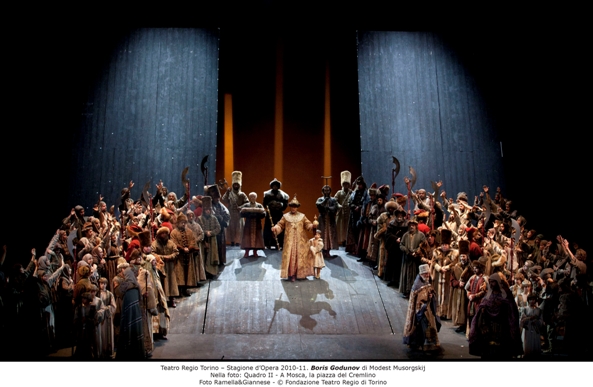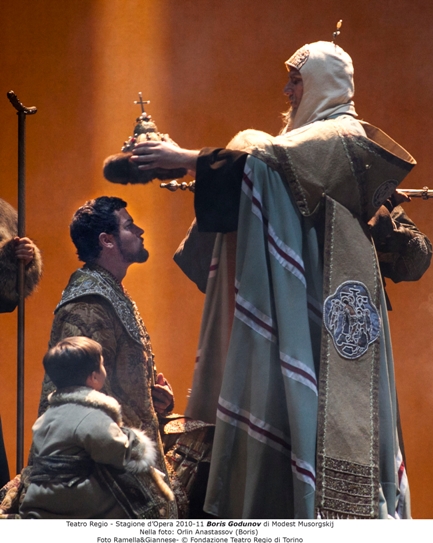
Mussorgsky’s Boris Godunov, on the stage of the Israel Opera as of next week, is considered to be Russia’s greatest national opera, and was one of the first operas created in an inherently Russian style. The Israel Opera’s Boris Godunov promises to be an intense, exceptional opera-going experience for Russian opera experts and novices alike.
In his short life, Modest Mussorgsky (1839-1881) witnessed a great wave of creativity in the world of Russian opera. During the rule of Catherine the Great, French and Italian operas dominated Russia’s Imperial Court. By the 19th century, however, a change was brewing in the Russian musical world with works such as with Mikhail Glinka’s A Life for the Tsar prophesying the development of Russian opera. In 1857, when Mussorgsky was a young man, he joined a group of composers, dubbed “The Mighty Five”, who were dedicated to the innovation of Russian music – still a relatively new concept.
Despite – or perhaps thanks to – his insufficient musical training, Mussorgsky had novel ideas about composing. He carried out some of these ideas as he worked towards his goal of creating a national epic opera, which would ideally complement the Russian language. It is unsurprising that he eventually chose a work by Aleksandr Pushkin, whose innovative linguistic style was not so different from Mussorgsky’s approach to composing: adapting their respective art forms to the Russian language, culture and natural landscape. The play, or “dramatic chronicle”, was inspired by Shakespeare’s histories, and Mussorgsky adapted it himself into an opera libretto. This work was Boris Godunov (1872).
Russian folk songs and church music are interspersed in the score – for example, the religious procession of Act I echoes Russian liturgical music, and thus it characterizes the Russian people waiting for news of the new Tsar. One might hear a variant of folk music in the monk Varlaam’s tavern song, in which he tells of the bloody siege of Kazan by Ivan the Terrible – father of Feodor I, Boris’ predecessor.
The accounts of the real Boris Godunov are marked by cover-ups and inconsistencies. Boris Godunov was Tsar of All Russia from 1598 to 1605, having been elected to the throne after his predecessor died without leaving an heir – the events covered in the opera’s prologue. He was falsely accused of murdering Dimitriy, the young son of Ivan the Terrible. A year before Boris’ death, a pretender named Grigoriy turned up, claiming to be Dimitriy. A long period of false claims, assassinations, and upheaval followed. Pushkin and Mussorgsky both based their texts on the 12-volume History of the Russian State, written by Russian chronicler Nikolay Karamzin. However, this account is today considered unreliable, as it accepts Boris’ murder of the Dimitriy.
A chronicler, Pimen the hermit, opens the opera’s first act, following the prologue. He tells his novice, Grigoriy, of the former Tsar and his son, comparing their devoutness with Boris’ regicidal impiety. Grigoriy thus hatches a plan to assume the identity of the dead prince. He attempts to trick policemen into arresting Varlaam, a vagabond monk. When his deception is discovered, he manages to escape.
In Act II, when Boris hears of the pretender, he develops a mad fear of dead children coming back to life to haunt him. His advisor Prince Shuysky gives a grisly account of Dimitriy’s death; later, the Tsar sees an apparition of the dead Tsarevich – much as Macbeth sees the ghost of Banquo.
Act III is devoted to the happenings in Poland surrounding the False Dimitriy and the Polish noblewoman Marina Mniszech, who would later marry Dimitriy and become Tsarina. Marina is greatly influenced by Rangoni, a Jesuit priest, and she expresses her ambition to rule Russia and restore the people to Catholicism, and she appears to be as talented at manipulation as the pretender himself. In a duet, she and Dimitriy declare an alliance.
Act IV restores the action to Moscow. Boris has another hallucination, which is witnessed by members of the court. Pimen the hermit is brought into court and tells of a blind man who regained his sight after praying at the grave of the murdered Dimitriy. The story greatly affects Boris, and he prays for mercy and dies. The people recognize the False Dimitriy as the rightful heir to the throne.
You can learn more about Boris Godunov and the Israel Opera’s new production at the Towards Opening lecture this Saturday, March 9th at 11:00. Tickets cost 70 NIS and can be purchased through the Israel Opera’s website. Also, a pre-performance lecture (in Hebrew) takes place in the auditorium before each performance.
Performance dates:
Day Date Hour back stage tours Opera Talkback
*Wed 13.3.13 19:00
Thur 14.3.13 19:00 After the show
Fri 15.3.13 12:00
Sat 16.3.13 19:00
Mon 18.3.13 19:00 17:45
Tue 19.3.13 19:00 17:45 After the show
Wed 20.3.13 19:00 17:45 After the show
Fri 22.3.13 12:00
Sat 23.3.13 19:00
Tue 26.3.13 19:00
Thur 28.3.13 19:00 17:45 After the show
Fri 29.3.13 12:00
Towards Opening: Saturday 9.3.13 11:00






